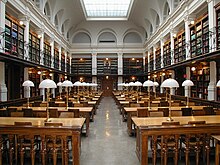Education
Education is about teaching, learning skills and knowledge. It also means helping people to learn how to do things and support them to think about what they learn. It's also important for educators to teach ways to find and use information.
Through education, the knowledge of society, country, and of the world is passed on from generation to generation. This may include education in morality, for example learning how to act as loyal, honest and effective citizens.
Education may help and guide individuals from one class to other. Educated individuals and groups can do things that the less educated cannot.
Types of education[change | change source]
There are different ways to categorize education, for example by age or subject. One way is to divide it into formal education, non-formal education, and informal education.
Formal education is usually in school, where a person may learn basic, academic, or trade skills. Small children often attend a nursery or kindergarten but often formal education begins in elementary school and continues with secondary school. Post-secondary education (or higher education) is usually at a college or university which may grant an academic degree.
Non-formal education includes adult basic education, adult literacy education or school equivalency preparation. In nonformal education someone (who is not in school) can learn literacy, other basic skills or job skills. Home education, individualized instruction (such as programmed learning), distance learning and computer-assisted instruction are other possibilities.
Informal education is less organized. It may be a parent teaching a child how to prepare a meal or ride a bicycle. People can also get an informal education by reading many books from a library or educational websites. This may also be called self-education.
Schooling[change | change source]
Many public schools provide a free education through the government. Parents may send their own children to a private schools, but they must pay for it. In some poorer places, some children cannot go to school, because their countries do not make education available in their countries, or because their families do not have enough money, or because the children have to work for money, or because the society have negative prejudice on education for girls.
There are primary schools and secondary schools. In many places they are government funded. Colleges and universities usually charge Tuition payments which may be very different in different countries.
Related pages[change | change source]
- Distance education
- Homeschooling – education at home
- Special education – education of students who have a disability
- Subject (school)
- Right to education
